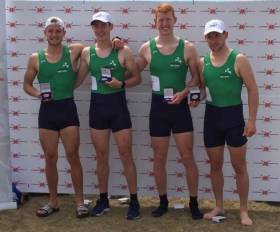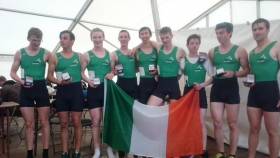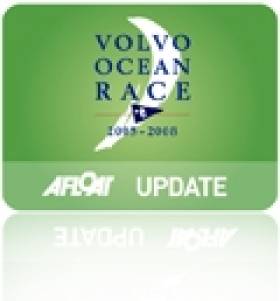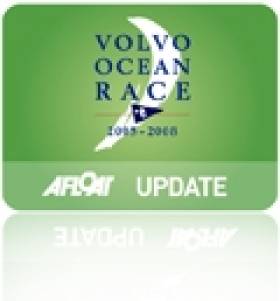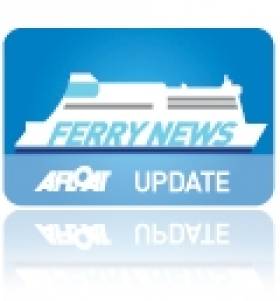Displaying items by tag: Cardiff
Three Wins for Ireland Crews at Home International Regatta
#Rowing: Ireland crews had three wins at the Home International Regatta at Cardiff Bay in Wales today. The all-Portora senior men’s four of Ryan Ballantine, Cormac McLaughlin, Lloyd Seaman and Barney Rix were victorious, though Ireland’s senior men finished third overall, behind England and Scotland.
Ireland’s senior women finished joint third with Wales, though they won the senior eight and four. Scotland outpointed England at the top of the table.
Ireland’s junior women amassed 19 points and finished a clear second behind England. The junior men finished on 16 points, the same tally as Scotland, behind clear winners England, on 25 points.
Home International Regatta, Cardiff (Selected results; points totals and Irish winners)
Senior Men: 1 England 32, 2 Scotland 30, 3 Ireland 25, 4 Wales 20. Four – 1 Ireland.
Junior Men: 1 England 25pts; 2 Ireland 16, Scotland 16; 4 Wales 10.
Senior Women: 1 Scotland 29, 2 England 27, 3 Ireland 23; Wales 23.
Eight: 1 Ireland. Four – 1 Ireland.
Junior Women: 1 England 23, 2 Ireland 19, 3 Scotland 18, 4 Wales 10.
Ireland Travel in Hope to Home International Regatta
The 2016 Home International Regatta takes place tomorrow in Cardiff Bay, Wales. Ireland, England, Scotland and Wales will compete to win the Victor Ludorum – or ‘the winner of the games’- in four categories: Senior Men, Senior Women, Junior Men and Junior Women. Last year in Strathclyde, Scotland won the title for senior men and Ireland the Junior Men, while England claimed both the Senior Women and Junior Women’s titles.
The event is now in its 54th year, and has been, for some, the pinnacle of their rowing career. For others - including Sean Drea and Steve Redgrave - it was a first step on the road to World and Olympic Championships. It offers the unique opportunity to watch and engage with top level athletes just weeks before the eyes of the world descend on Rio for the Olympic Games this year.
The course runs from the Penarth end of Barrage to finish at Mermaid Quay, and the open viewing and easy access for spectators means the Home International Regatta at Cardiff Bay is one of the best for showcasing the sport of rowing.
The Irish Team is as follows:
Senior Men Sweep Team: Luke McCann (QUB BC,) Miles Taylor (QUB BC), Ciaran Higgins (UCC RC), Simon Kearney (UCC RC), Barney Rix (Portora BC), Ryan Ballantine (Portora BC), Lloyd Seaman (Portora BC), Cormac McLaughlin (Portora BC), Ross Thompson (UCD BC), Niall Farrell (UCD BC), David Keohane (UCC RC), Brian Keohane (UCC RC), Cox: Gavin Connolly (Commercial RC), Coach: Paul Thornton (UCC RC)
Senior Men Sculling Team: Damien Kelly (Garda BC), Tom Dillon (NUIG BC), Alan Prendergast (Shandon BC), Dan Begley (Shandon BC), Andrew O’Connor (Castleconnell BC), Hugh Sutton (Lee RC), Coach: Martin Kilbane (Cork BC)
Senior Women Sweep Team: Dineka Maguire (Bann RC), Katie Shirlow (Bann RC), Gill Crowe (DULBC), Hazel O’Neill (DULBC), Aifric Keogh (UCC RC), Caoimhe Joyce Hearne (UCC RC), Aoife Feeley (UCC RC), Roisin Maguire (QUBLBC), Lauren McHugh (DULBC), Sarah Higgins (DULBC), Rebecca Davidson (QUBLBC), Siofra Corr (QUBLBC), Cox: Gemma Canham (QUBLBC), Coach: Andrew Coleman (DULBC)
Senior Women Sculling Team: Marie Piggott (NUIG BC), Lydia Heaphy (Skibbereen RC), Olivia Blundell (Belfast BC), Selma Bouanane (Fermoy RC), Cliodhna Nolan (Carlow RC), Aoife Byrne (Carlow RC), Coach: John Armstrong (Belfast BC)
Junior Men Sweep Team: Alan O’Keeffe (Presentation RC), Rory Tummons (St Josephs RC), Gerry Mannion (St Josephs RC), James Foster (Portora BC), Aaron Christie (Bann RC), Rory Gilligan (Hampton School -UK), Brion O’Rourke (St Josephs RC), Ben McKeon (St Michaels RC) Cox: Cliff Wanjau (St Josephs RC), Jack Stacey (Commercial RC), Edward Meehan (Commercial RC), Coach: John Walsh (St Josephs RC)
Junior Men Sculling Team: Fergal O’Sullivan (Cork BC), Darragh Larkin (Lee RC), Cathal Cummins (Lee Valley RC), Oisin Nolan (Carlow RC), Liam O’Connell (Cork BC), Gavin Morrison (Fermoy RC), Dylan Mitchell (Belfast BC), Coach: Ray Morrison (Fermoy RC)
Junior Women Sweep Team: Lucy McIntyre (Methodist BC), Rachel McBrinn (Methodist BC), Megan Tully (Shannon RC), Megan Carmody (Shannon RC), Miriam Kelly (Portora BC), Mia Jane Elliott (Portora BC), Siobhan Maxwell (Commercial RC), Aisling Keogh (Commercial RC), Maebh Heaney (Lee RC), Mia Kovacs (Shandon BC), Cox: Hannah Adams (Methodist BC), Coach: Mike Reidy (Commercial RC)
Junior Women Sculling Team: Claire Synnott (Lee RC), Claire Ferrick (Neptune RC), Caoileann Nic Dhonncha (Col Iognaid RC), Julia Vascotto (Castleconnell BC), Aoibhinn Keating (Skibbereen RC), Georgia O’Brien (Kenmare RC), Alana O’Donovan (Bann RC), Coach: Amy Phelan (Col Iognaid)
Cardiff Will Host Volvo Ocean Race in 2017-18
#VOR - The Volvo Ocean Race will come to the Irish Sea for its 13th edition as Cardiff has been announced as a host port for the 2017-18 race.
It will be the first time the UK has hosted the round-the-world yachting challenge since the 2005-06 edition, and the first time ever that Wales has welcomed the race.
"Cardiff made a particularly impressive bid to win one of the coveted European slots and with such outstanding facilities and great enthusiasm I'm convinced that we will have a stopover to remember," said VOR COO Tom Touber at the announcement in Cardiff Bay.
"The fact that we are making this announcement five years in advance is a very strong signal about the future of the race and the commitment to it from the Volvo companies."
Cardiff Council Leader Cllr Heather Joyce said the event "will bring hundreds of thousands of visitors to the city, and be hugely beneficial to the local economy."
She added: “Being awarded the successful bid for one of the most important sailing events in the world once again demonstrates Cardiff’s ability to deliver major international sporting events on the world stage.
"It proves our reputation as an event city as well as providing an opportunity for many non sailors to try the sport through a co-ordinated programme of sailing activities before, during and following the event.”
The good news for Cardiff comes just says after Lisbon was announced as the latest host port for the 2014-15 edition of the Volvo Ocean Race. Ireland will sadly have no host port in the next running of the VOR despite the success of Galway's race finale last summer.
Cardiff to Make Bid for Volvo Ocean Race
#VOLVO OCEAN RACE - Cardiff in Wales is submitting a bid to host the 2017-2018 edition of Volvo Ocean Race, as yourCardiff reports.
The city's council has signed off on £3 million (€3.7 million) plans to host a stopover on the race route, bidding alongside a shortlist of 30 other cities ahead of an official decision by the race authorities in December.
Cardiff's bid is subject to confirmation of support from the Welsh government and the Cardiff Harbour Authority to cover the costs of the race village, entertainment and media facilities, and management of the race itself over a proposed two-week stopover.
It's estimated that the VOR could bring in millions to the city's economy and "expand Cardiff's reputation as an event city by hosting one of the most important sailing events in the world", according to a report submitted to the council.
The news comes days after organisers of this summer's Volvo Ocean Race finale in Galway postponed their decision on making a third bid to host the race, as previously reported on Afloat.ie.
Let's Do It Global said the move was to enable the group to concentrate on paying off its outstanding debts of €400,000 which it says were incurred in the wake of "adverse weather" and increased security costs due to the "outstanding success of the event".
Anniversary Sailing Bound for the Rugby
West Cork Tourism Co-Op launched the company a year ago as a result of a successful campaign to restore the direct service between Wales and the southern Ireland. Many businesses from the region and their Welsh counterparts invested in the co-op to restore the link since the closure by Swansea Cork Ferries in 2006.
Fastnet Line will continue to be in a celebratory mode with the first outbound sailing from Cork on Friday and which will also cater for a special-rugby supporters trip for this weekend's Six Nations Championship between Ireland and Wales at the Millenium Stadium, Cardiff. The Friday sailing departs Cork at 20.30hrs and arrives at 08.00hrs in Swansea on the Saturday morning with the game kicking off at 17.00hrs (5pm).
The company are offering various foot passenger deals to the match. A return bus transfer is also available between the ferry terminal and the game venue (but at an extra cost). In addition there are deals for those wanting to take the car. The after match sailing departs at 23.50 with the ferry arriving back in Cork at 12.00 noon on Sunday 13 March. For further information on fares etc click here


























